PACTMAN: Trust, Privacy and Consent in Future Pervasive Environments
Supporting Stimulation Needs in Dementia Care through Wall-Sized Displays
Sas , C., Davies, N., Clinch, S,. Shaw, P., Mikusz, M., Steeds, M., Nohrer, L. (2020) Supporting Stimulation Needs in Dementia Care through Wall-Sized Displays. Accepted into Workshop at The ACM CHI Conference on Human Factors in Computing Systems (CHI 2020)
Following up on the deployment of the Wall-sized display that was installed into the Heathfield Ladies Residential Home by researchers at Lancaster University and University of Manchester, a paper reporting findings from the initial year of the deployment has now been accepted into an international conference on Human-Computer Interaction (CHI 2020) set to be presented in April 2020.
Abstract:
Beside reminiscing, the increasing cognitive decline in dementia can also be addressed through sensory stimulation allowing the immediate, nonverbal engagement with the world through one’s senses. Much HCI work has prioritised cognitive stimulation for reminiscing or personhood often on small screens, while less research has explored sensory stimulation like the one enabled by large displays. We describe a year-long deployment in a residential care home of a wall-sized display, and explored its domestication through 24 contextual interviews. Findings indicate strong engagement and attachment to the dis¬play which has inspired four psychosocial interventions using online generic content. We discuss the value of these findings for personhood through residents’ exercise of choices, the ten-sion between generic/personal content and its public/private use, the importance of participatory research approach to domestication, and the infrastructure-based prototype, illustrated by the DementiaWall and its generative quality.
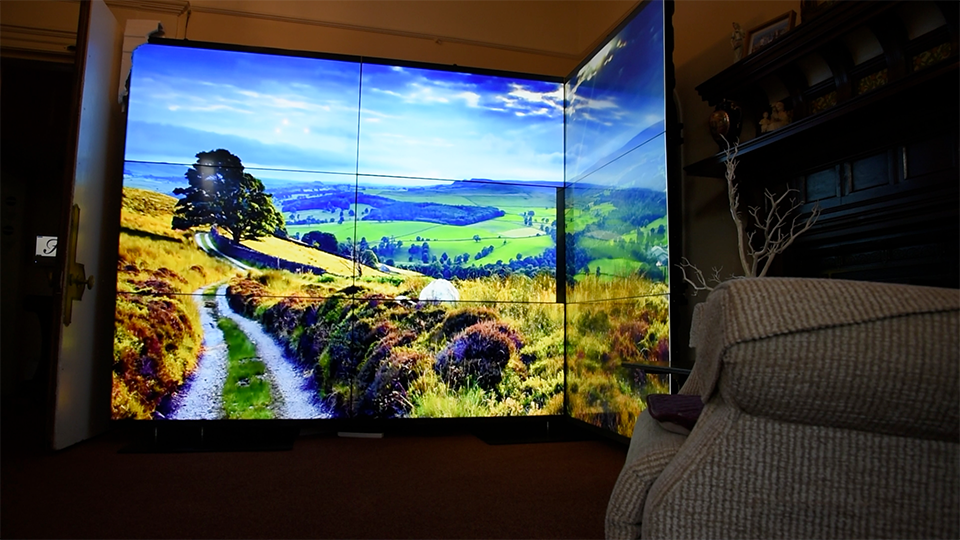
RECAPP-XPR: A smartphone application for presenting and recalling experimentally controlled stimuli over longer timescales
Cortis Mack, C., Harding, M., Davies, N., & Ward, G. (2019). RECAPP-XPR: A smartphone application for presenting and recalling experimentally controlled stimuli over longer timescales. Behavior research methods, 51(4), 1804-1823.
Members from the PACTMAN team at University of Essex (Cathleen Cortis Mack and Geoff Ward) and Lancaster University (Mike Harding and Nigel Davies) have published a detailed account of the RECAPP-XPR application in the international journal, Behaviour research methods. This iPhone application can be used for presenting and recalling experimentally controlled stimuli over extended timescales.
Historically, many psychology experiments examine human memory by testing memory for lists of carefully-controlled stimuli in the laboratory under specified schedules. Although great progress has occurred using these methods, they are most effective at understanding memory for events that are separated and recalled after intervals of seconds or at most minutes. By contrast, it would be unfeasible to invite participants back to the laboratory in order to present sequences of items separated by hours, days, or weeks.
We follow up on our recent work (Cortis Mack, Davies, Harding & Ward, 2017) and we report two experiments that used smartphone applications for presenting and recalling verbal stimuli over extended timescales. In Experiment 1, we used an iPhone application that we had developed, called RECAPP-XPR, to present 76 participants with a single list of eight words presented at a rate of one word every hour, followed by a test of free recall an hour later. The experiment was exceptionally easy to schedule, taking only between 5 and 10 min to set up using a web-based interface. RECAPP-XPR randomly samples the stimuli, presents the stimuli, and collects the free recall data. The stimuli disappear shortly after they have been presented, and RECAPP-XPR collects data on when each stimulus was viewed.
In Experiment 2, the study was replicated using the widely used image-sharing application Snapchat. A total of 197 participants were tested by 38 student experimenters, who manually presented the stimuli as “snaps” of experimentally controlled stimuli using the same experimental rates that had been used in Experiment 1. Like all snaps, these stimuli disappeared from view after a very short interval. In both experiments, we observed significant recall advantages for the first and last list items (primacy and recency effects, respectively), and there were clear tendencies to make more transitions at output between near-neighbouring items, with a forward-ordered bias, consistent with temporal contiguity effects. The respective advantages and disadvantages of RECAPP-XPR and Snapchat as experimental software packages are discussed, as is the relationship between single-study-list smartphone experiments and long-term recency studies of real-world events.
Cortis Mack, C., Cinel, C., Davies, N., Harding, M., & Ward, G. (2017). Serial position, output order, and list length effects for words presented on smartphones over very long intervals. Journal of memory and language, 97, 61-80.
Technology-Induced Human Memory Degradation
Members of the PACTMAN consortium participated in the “CHI4EVIL: Creative Speculation on the Negative Effects of HCI Research” workshop at CHI 2019. Their paper explored the ways technology could induce memory degradation either as by product of a benevolent system or as a purposeful method of manipulating memory. The paper presented a design fiction where a device was created to support memory and how this then could be used to manipulate memory, and the dangers of relying wholly on technology. The paper further discussed ethical concerns of research in this space.
The paper was discussed with other papers at CHI 2019 in Glasgow, Scotland. During the workshop, other participants indicated they were interested in the link between technology and psychology explored in the paper.
Should I Agree? Delegating Consent Decisions Beyond the Individual
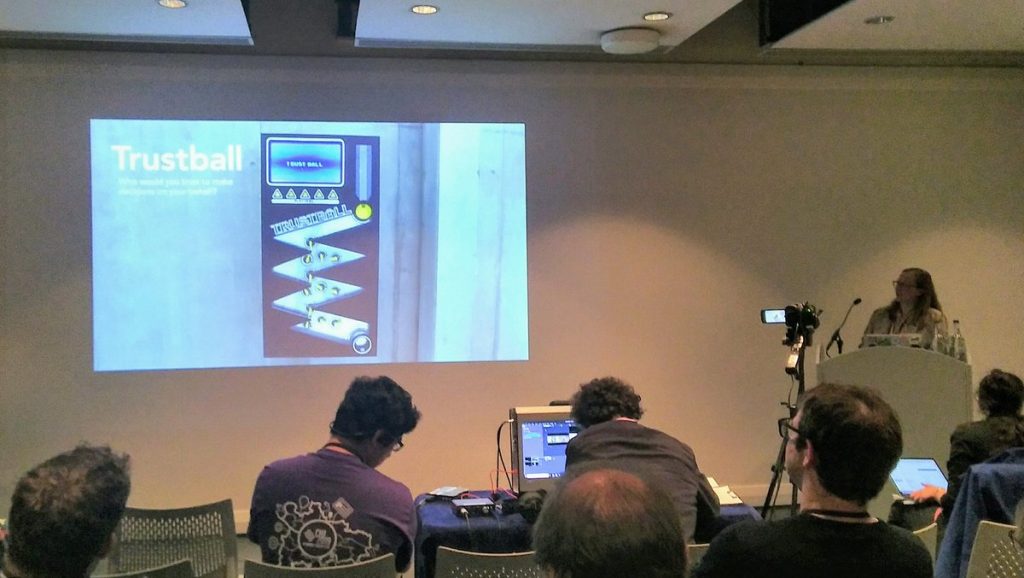
Bettina Nissen was presenting our paper “Should I Agree? Delegating Consent Decisions Beyond the Individual” about our study and findings from Trustball at CHI in Glasgow in May 2019.
If you couldn’t make it there, please see further information about this project and talk here:
- download the slides with notes: Nissen CHI slides
- download the published paper Nissen et al 2019 paper
- check out a video about the Trustball interaction https://vimeo.com/334920065
Second PACTMAN PhD/early career researcher symposium
The PACTMAN members from Edinburgh have now hosted the second networking and development event for PhD students and early career researchers working in the TIPS (Trust, Identity, Privacy, and Security) space. The symposium was held at the Dovecot Studios in the heart of Edinburgh in early December. Dovecot Studios is a landmark centre for contemporary art, craft and design offering stunning studio spaces used for the symposium and various workshops.
The 2-day event offered keynote speakers and multiple workshops from members of the TIPS community, and poster/demo sessions for the researchers to share their work with others, consisting of a diverse set of backgrounds and expertise.
The key areas and topics discussed over the various activities included:
- Privacy and designing for automated decisions
- Identity management for distributed services
- Voice controlled trust and security in the Internet of Things
- Social values in computing and ‘intelligence’ of AI
- Bias in system development and pervasive algorithms
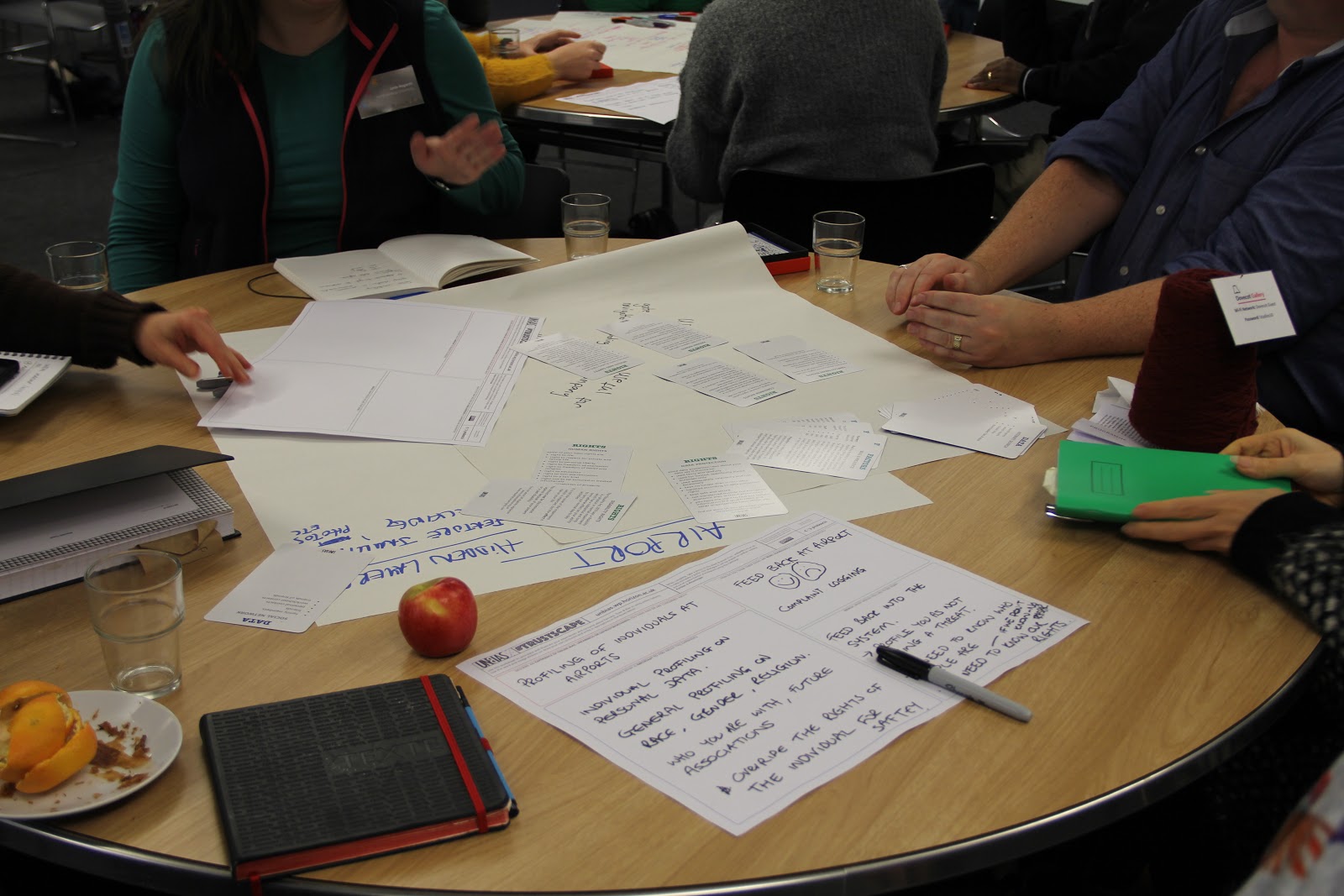
A total of 5 interactive workshops were held throughout the event convened by experts in designing for trust, security, and privacy.
PizzaBlock: A Blockchain Identity Management Workshop
Chris Elsden and Jonathan Rankin
Chris and Jonathan ran a design-led workshop around the premise of blockchain-based identity management in the form of a co-operative game, where participants were tasked to act as individuals or organisations acquiring, managing and verifying ‘pizza-making’ skills to each other through blockchain=based artefacts and a distributed ledger.
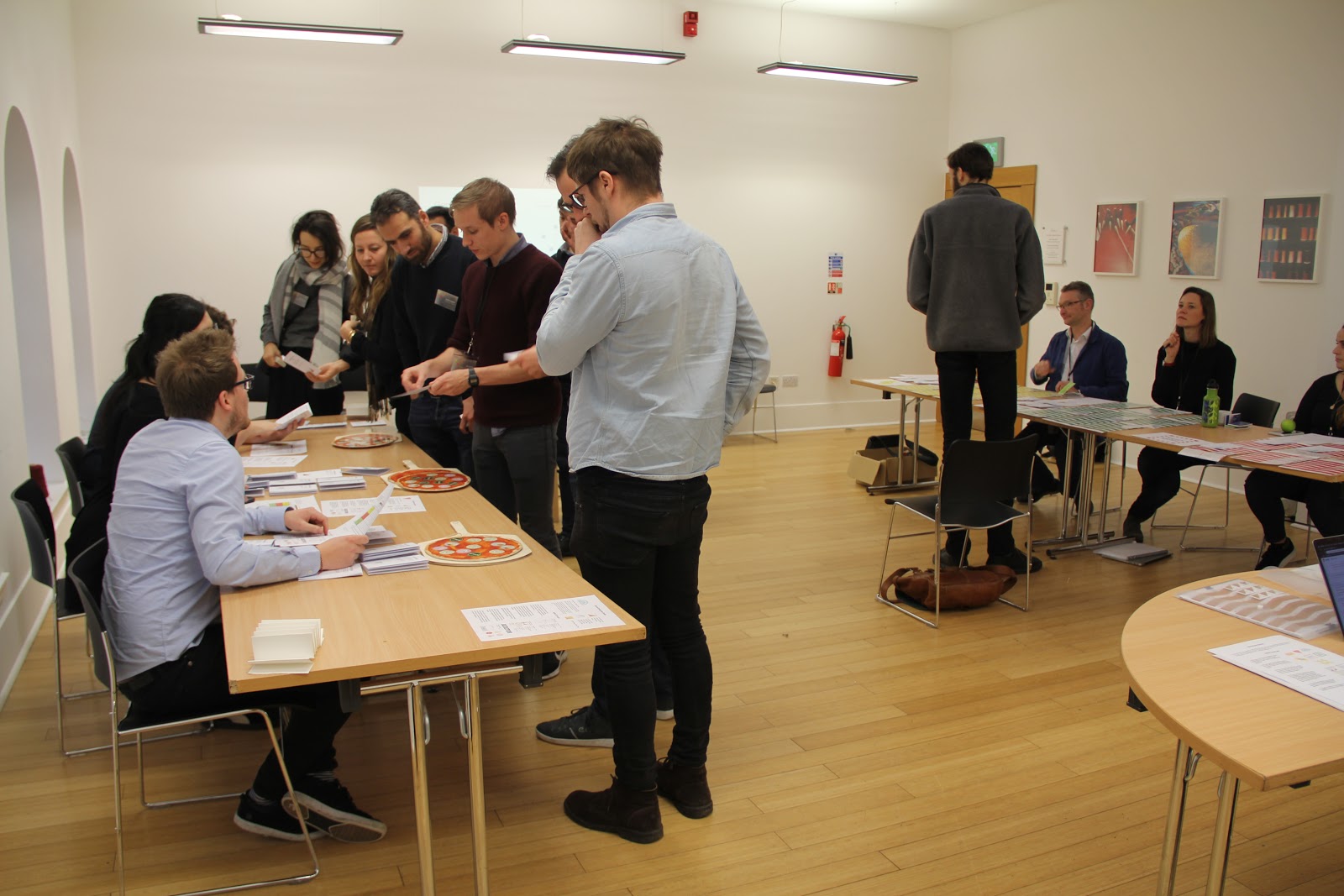
Alien AI and the Criterion of Intelligence
Maria Angela Ferrario and Stephen Forshaw
What would happen if Aliens landed on earth? And how can thinking about aliens help us think about AI? This workshop centred around the discussion what can be considered intelligence? What is the criteria we have now? What do we do with this alien called AI? More in a round table setting, discussions of participants quickly evolved around the distinction between intelligence and learning and how criteria can be applied in different environments.
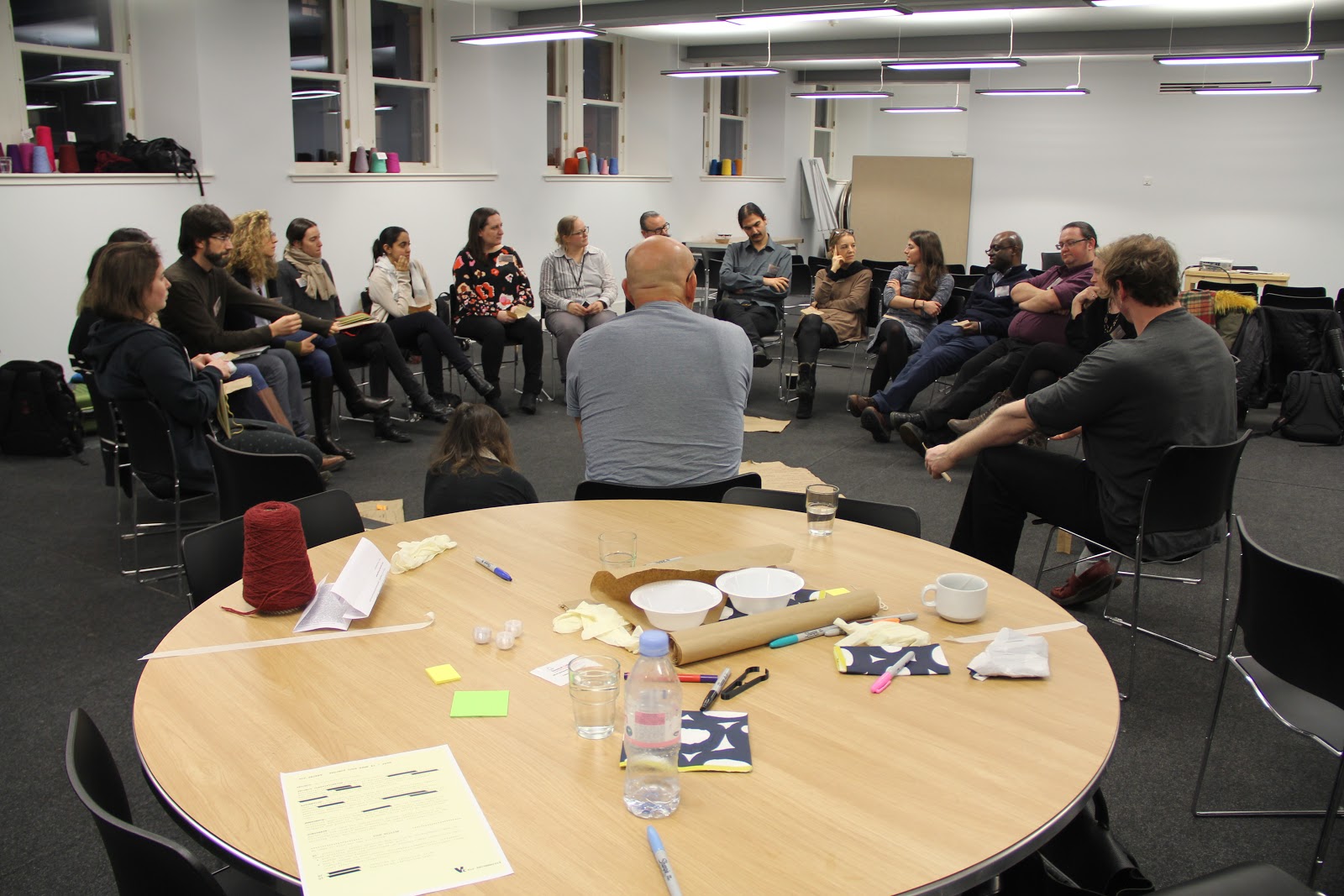
ParkLife
Simon Chapple, Morgan Currie, and Cat Magill
ParkLife project is a city-University collaborative initiative looking at new ways to use data and digital technologies to understand how parks are used and valued and to engage park users in shaping the future of parks. The workshop first introduced some of the city council and research partners and their aims, goals and perspectives on it. After this, participants formed groups that explored how technologies such as sensor networks could be of use for ParkLife. Heated discussions occurred with the question around data protection and GDPR compliance as well as what could be done with different technologies. Should there be a count of how many people enter and leave the park? Could gaze recognition help identify who is using the park in what way and how mobile are they? Can there be an app that supports visitors and residents alike making the most of Edinburgs’ parks? How can these technologies be future-proof?
Unbias: Exploring Fairness in Pervasive Environments
Giles Lane
During the UNbias workshop, participants were introduced to the UnBias Fairness Toolkit, including a booklet and and a set of awareness cards. After a short introduction into the toolkit, the participants were divided into groups and given different topics. The topics focused on contemporary developments of the introduction and use of algorithmic systems in public spaces, e.g. for transportation or administrative tasks. The cards were great tool to build awareness of how bias and unfairness can occur in these areas and how they can be amplified or even new ones can be introduced by algorithmic systems. After the groups completed their tasks, a group discussion followed. The discussion brought together critical perspectives from a variety of research and engagement angles.
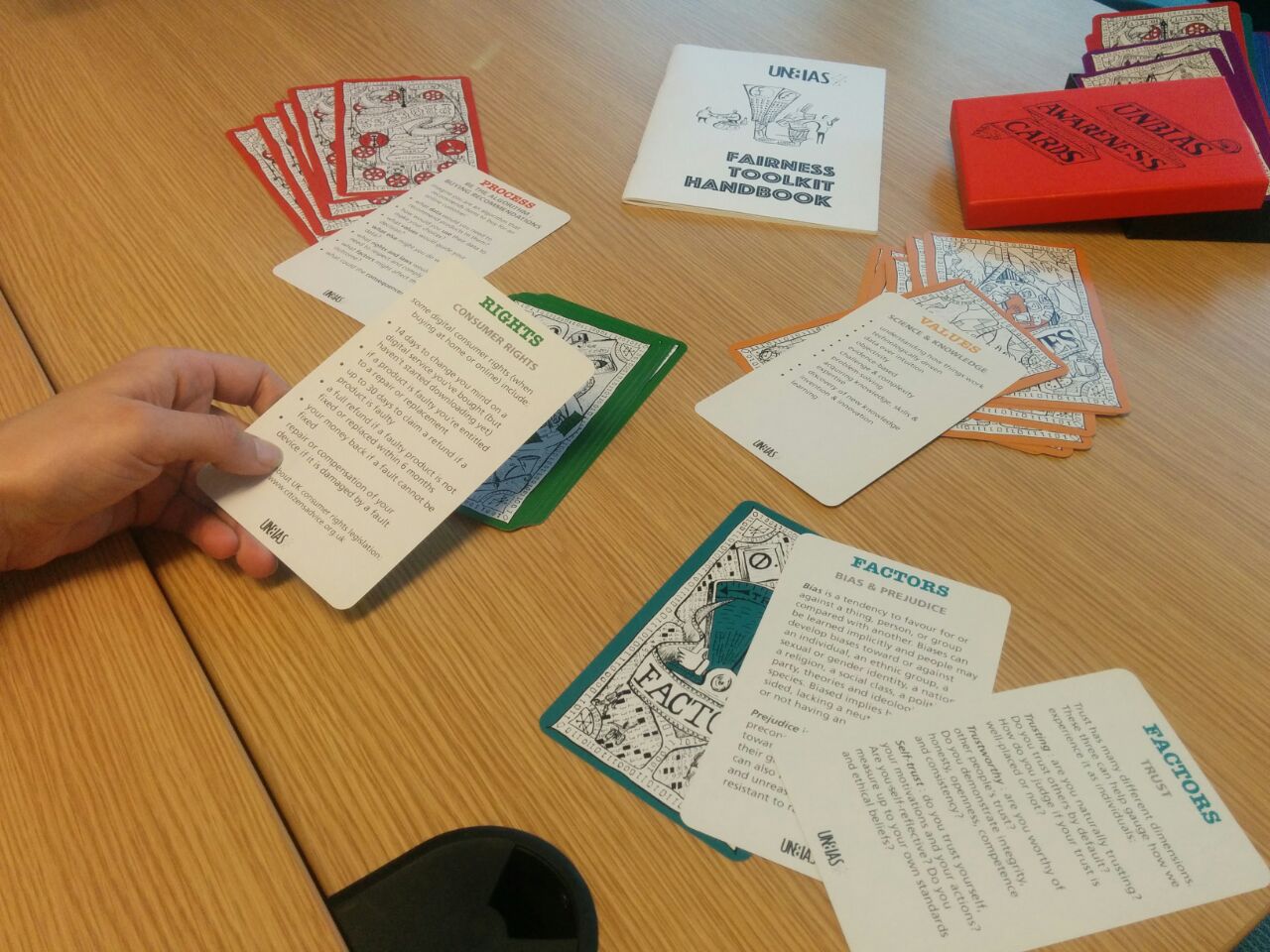
Trust me! I’m a Talking Donkey
Joseph Lindley, Adrian Gradinar, Paul Coulton
Smart devices and IoT are becoming more and more embedded into our daily lives. With the added convenience, issues around trust and consent are often not at the forefront when designing and developing those devices and their interfaces. In this workshop, the conveners used design fiction to help participants imagining and speculating about new scenarios and constellations of voice-controlled IoT devices: prayer companion, invisible friends and talking pharmacies.
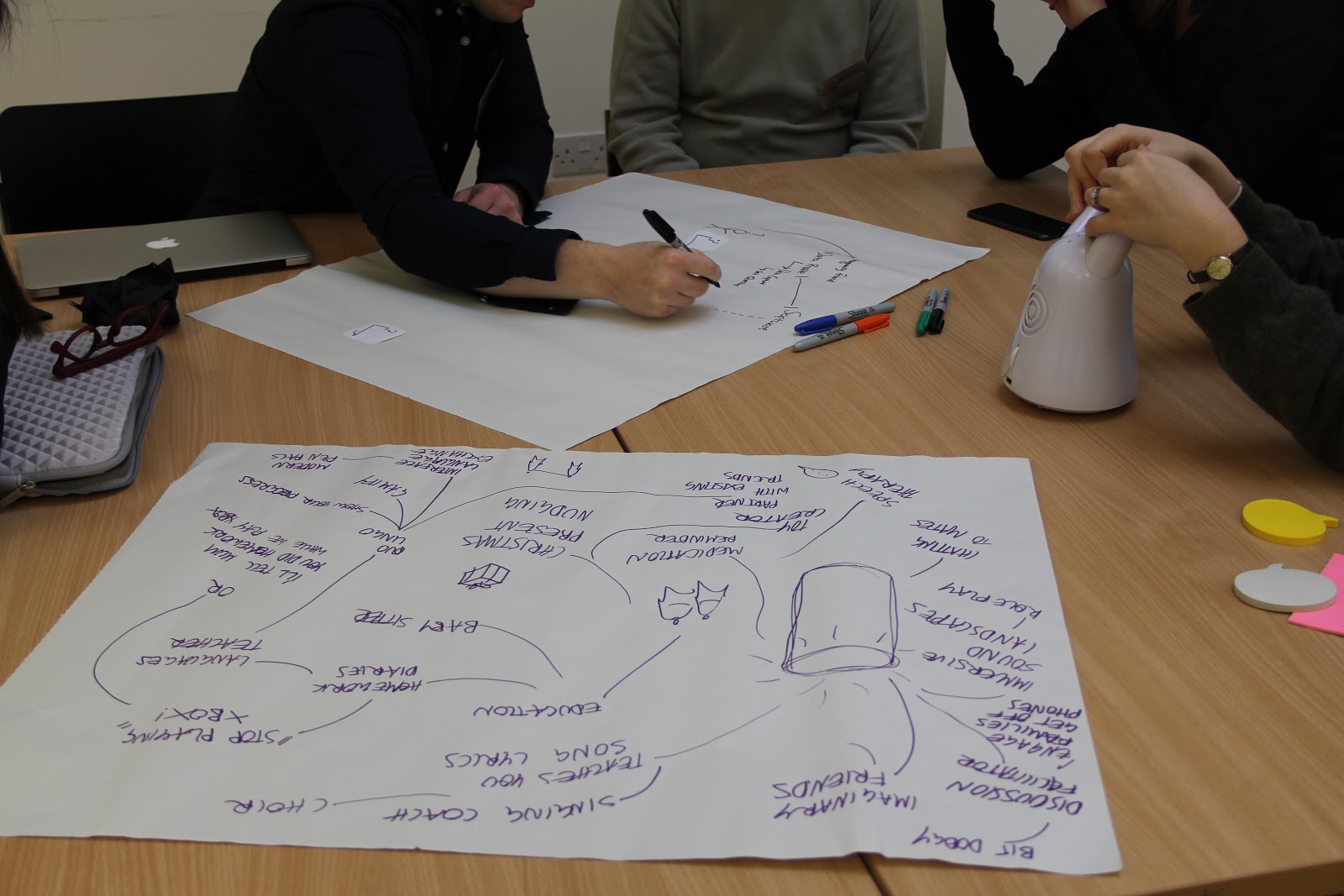
Trustball – Who do you Trust to Consent?
As part of the Edinburgh Festival, we have developed a public installation to explore issues of trust and consent in digital systems with the general public. Installed in the Design Informatics Pavilion “Data Pipe Dreams: Glimpses of a Near Future”, Trustball aims to playfully engage audiences with the fairly dry topic of agreeing to Terms and Conditions. We are all familiar with and are regularly signing up to new services, websites or apps online which prompt us to accept the Terms of Services (ToS). These have become increasingly complex and their details are often opaque to the user. A quick one-click act of consenting to complex legal jargon in a hidden fine print has become an accepted practice for most users.


Trustball aims to explore this moment and interaction of digital consent further and question how we might agree to ToS in the future. By playfully engaging audiences with a tangible, arcade-style game, we aim to reveal and challenge people’s ToS practices and explore potential novel practices of delegating consent. The flawed practice of individual’s accepting ToS without reading them has become common place but how can we move away from the individual’s responsibility of accepting consent? By exploring alternative models of consent and delegation, we ask if there could be other models of delegating consent and if so, who would you trust to understand the legal jargon and have your best interest at heart? Would you consider delegating this responsibility to someone else or would you want to remain in control? Who would you trust to advise and accept the right kind of ToS on your behalf – a friend, an expert, a group of people or a bot?
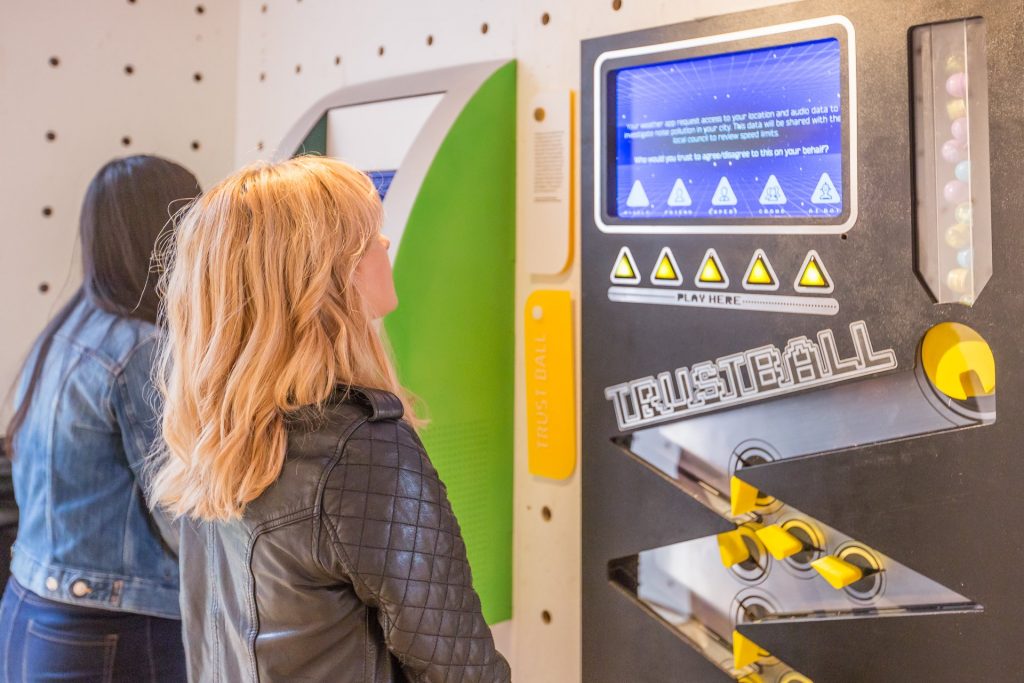
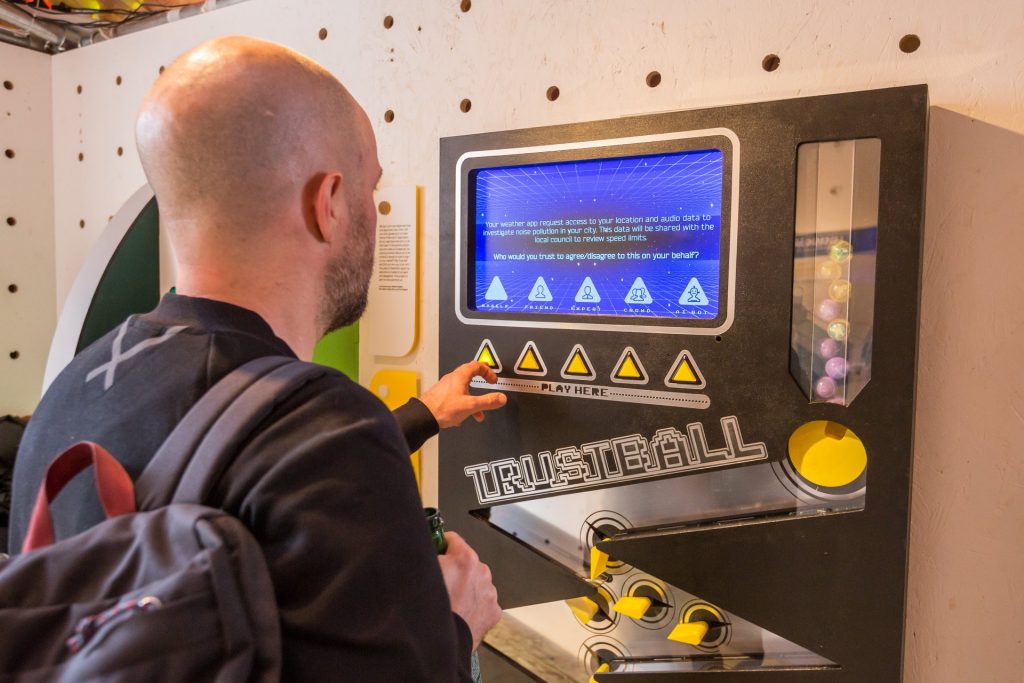
If you would like to play Trustball and see who you would trust with this playful interaction, you can find us outside the Assembly Rooms on 54 George Street in Edinburgh (EH2 2LR) from 2nd – 25th August 2018 (11am–6pm). If you would like to know more about Trustball or have any questions, please email bettina.nissen[at]ed.ac.uk.
Exploring Trust in Distributed Systems
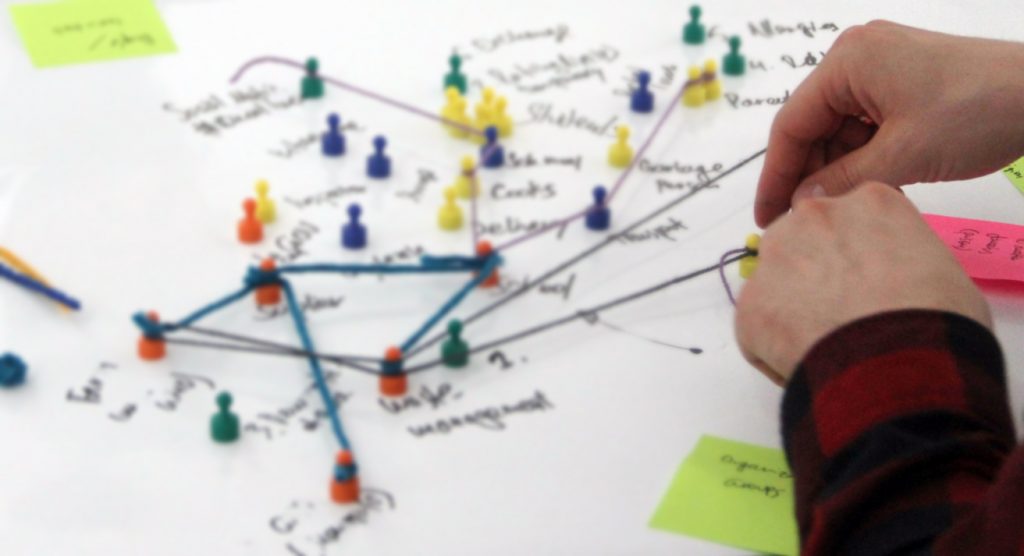
We will be running a workshop as part of the DRS conference in Limerick on the 25th June 2018. This design workshop will be highly participatory with a short introduction to distributed systems followed by several group activities exploring trust in digital systems. We will investigate the changing trust relationships in existing centralised to more distributed systems using a wide selection of tangible materials. Using material affordances to represent different relationships and aspects of trust, participants will map relations between individual actors and organisations. Discussing and highlighting existing trust relationships and potential shifts emerging in distributed systems will raise questions around existing trust relationships in digital systems and how they emerge or manifest. Who do we trust and how do we build trust? What are the relationships between trust and aspects of transparency, control or convenience? What influences trust in digital relationships, and ultimately, what can the design community learn from this untangling of trust relationships in future distributed systems for novel forms of interactions? Using accessible, tangible tools in this workshop to investigate trust relationships will also offer insights into material affordances, their potentially representative nature of trust and their prospects of facilitating debate around various forms of relationships in distributed systems.
The workshop will take place on Monday 25th June 2018 from 14:00 – 17:30 at the University of Limerick in Ireland. Find more details about the workshop here or have a look at the overall conference programme on the Design Research Society website.
Keynote, Presentations and Demo at PerDis 2018
Members of the PACTMAN consortium represented the latest PACTMAN-related research at the 7th ACM Symposium on Pervasive Displays (PerDis 2018) in Munich, Germany.
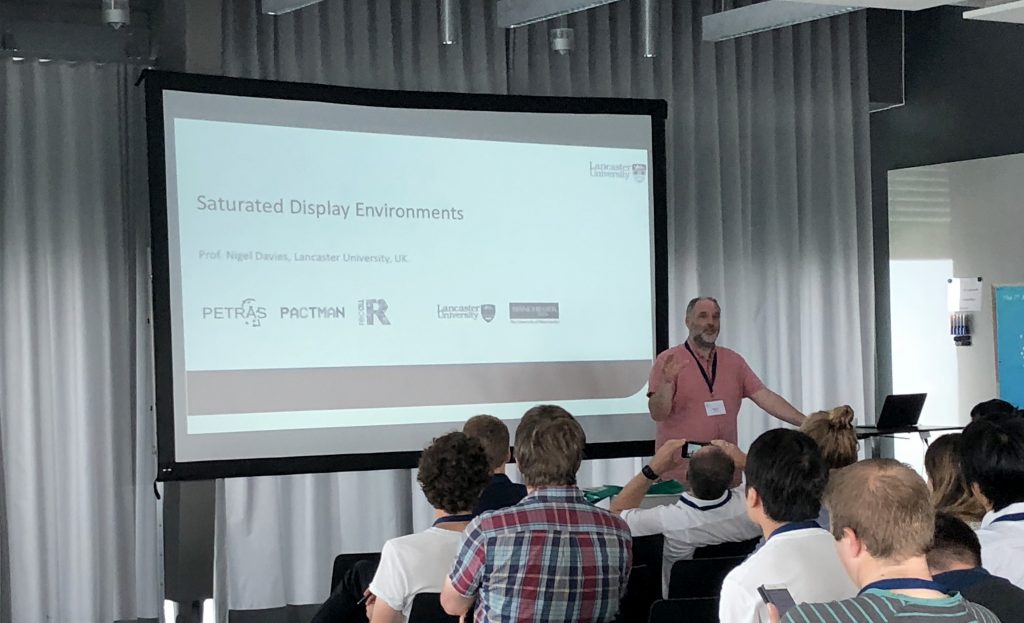
Nigel Davies – Keynote at PerDis 2018
Nigel Davies was invited to give a keynote on “Saturated Display Environments”, introducing future research opportunities in the area of pervasive displays led by the trend and vision in which displays become truly ubiquitous and saturate the physical environment.
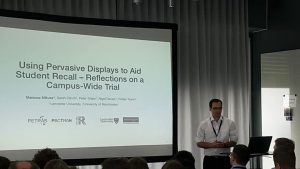
Mateusz Mikusz presenting work on helping students recall lecture content.
Mateusz Mikusz presented “Using Pervasive Displays to Aid Student Recall — Reflections on a Campus-Wide Trial“. This work formed the foundation and initial implementation for the PACTMAN-led display personalisation trial and specifically investigated the use of pervasive displays as part of an integrated learning environment to help students recall lecture content as they move across campus and walk by displays on their way to lectures, labs or colleges. The research on improving student recall was conducted as part of the PETRAS IoT Research Hub, the EU-funded FET7 project RECALL and PACTMAN.
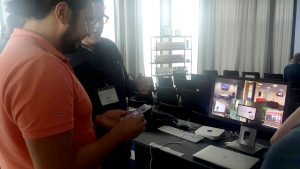
Peter Shaw demonstrating display personalisation technology.
In the context of the display personalisation trial, Peter Shaw demonstrated the underlaying technology including the Tacita mobile application and corresponding display technology to participants of PerDis 2018. The demonstration sparked discussions for potential future collaborations with researchers from the pervasive displays community.
Jake Patterson presented SlideTalk, a piece of work conducted with Sarah Clinch on investigating new forms of smartphone-based interaction modalities specifically designed to improve user engagement and experience with public displays.
Retrieval-Induced Forgetting in the Real World – Work published in the Journal of Experimental Psychology: General.
Researchers at the University of Essex have recently had their work accepted in the prestigious Journal of Experimental Psychology: General. This paper examines the contention that an end-of-day review could lead to augmentation in human memory and includes six Experiments.
In Experiment 1, participants were taken on a campus tour and shown a number of different to-be-remembered objects in different university locations (e.g. a printer in the Library). Each to-be-remembered object was presented with an associated specific comment (e.g. “This is the most used printer in the Library”). Participants were then shown the location name and photographs of half of the objects from half of the locations, and they were asked to try to name the object and recall the associated comment specific to each item. Following a filled delay, participants were presented with the name of each campus location and were asked to free recall the to-be-remembered objects. Relative to the recall from the unpracticed location categories, participants recalled the names of significantly more objects that they practiced (retrieval practice) and significantly fewer unpracticed objects from the practiced locations (retrieval-induced forgetting, RIF). These findings were replicated in Experiment 2 using a campus scavenger hunt in which participants selected their own stimuli from specified experimenter’s categories (e.g. Find 6 edible things, 6 orange things, etc.). Following an examination of factors that maximized the effects of RIF and retrieval practice in the laboratory (Experiment 3), we applied these findings to the campus scavenger hunt task to create different retrieval practice schedules to maximize and minimize recall of items based on experimenter-selected (Experiment 4) and participant-selected items using both category-cued free recall (Experiment 5) and item-specific cues (Experiment 6). The paper supports the claim that an interactive, end-of-day review could lead toaugmentation in human memory.
This work will also be presented by Prof. Geoff Ward in a Keynote speech given in June,2018, as part of the Summer School of the Swiss Graduate School for Cognition, Learning and Memory entitled: ‘Perspective on human Memory: Memory functioning and memory failures’.
A Participant’s Report of the PACTMAN ECR networking event
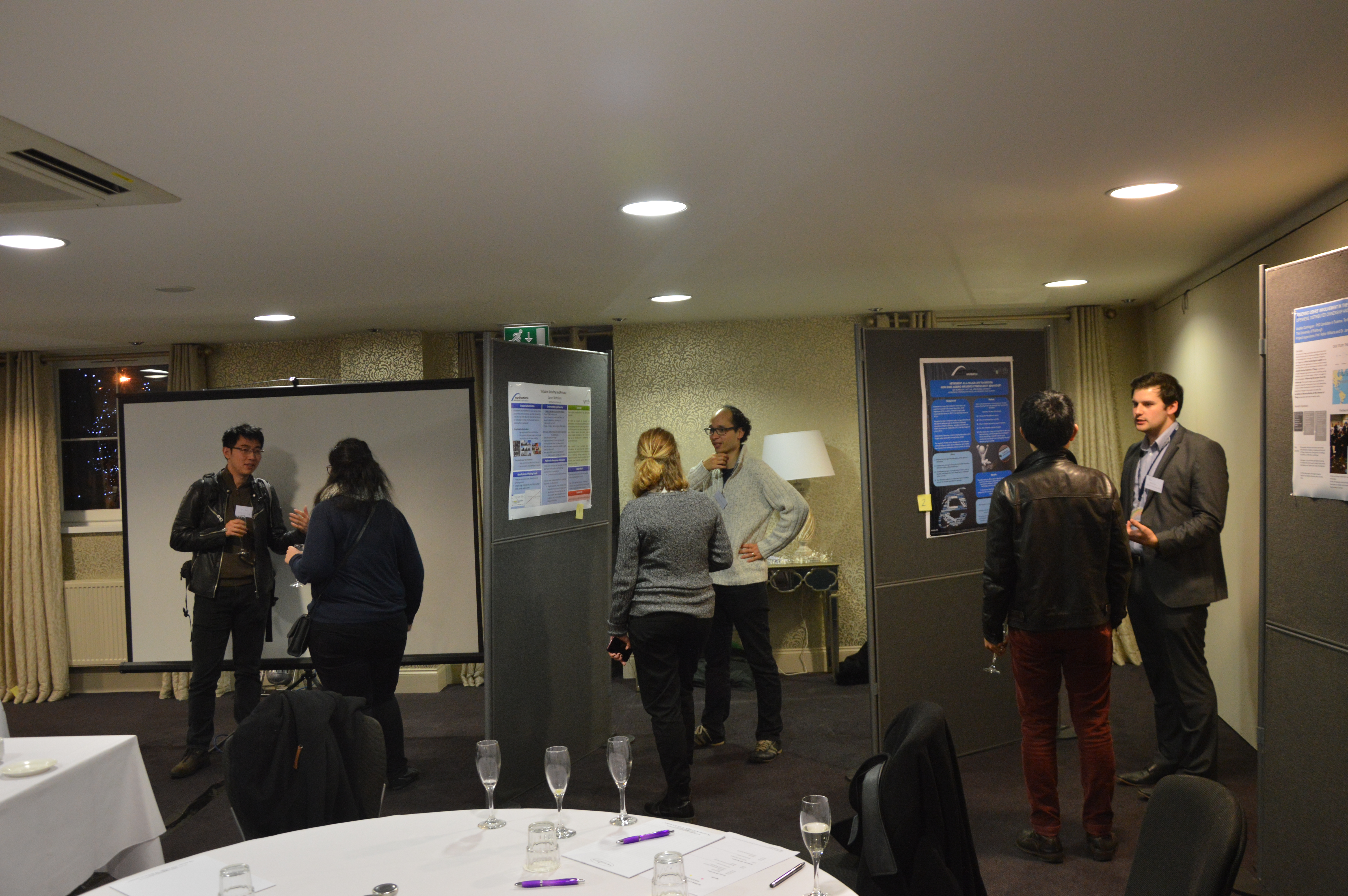
The PACTMAN project recently hosted the first of two networking and development events for PhD students and early career researchers. In this blog post, one of the attending research associates Naushin Nower reports her experiences…
The workshop provided a platform for attendees to present and explore the real world problems and solutions from interdisciplinary research (Computer science, Psychology, Law etc.) that concentrated in the areas of privacy, trust, identity, and security. Along with keynote speech from Dr. David De Roure, various other interactive workshops were organized to sharpen the state-of-the-art knowledge and to build a community by bringing UK-based young scientists together. Over thirty Ph.D. students and early career researchers participated from fifteen universities across the U.K. A further nine experts from across academia led the five interactive workshops.
Dr. David De Roure, Professor of e-Research at the University of Oxford, presented the keynote. As he explored multiple disciplines (social science, humanities, Internet of things and distributed systems and social computing), he provided an inspirational discussion about different aspects of the “social machine” and its relation with Internet of things (IoT). Defining social machines as any web-based socio-technical system where both human and machine are the participants, some common examples include Facebook, Twitter (social websites) and crowdsourcing sites where behaviour is constructed socially and website acts as an interface between human and machine. In contrast to these social machines that connect people, everyday IoT devices connect and interact with each other. The social machine can provide a framework for evaluating the benefits and risk of IoT by utilizing the thing learned from the social network. Since the social machine is already applied in social media, it can provide an opportunity for IoT as well, where the new social process, behaviour and unintended situations can be visualized.
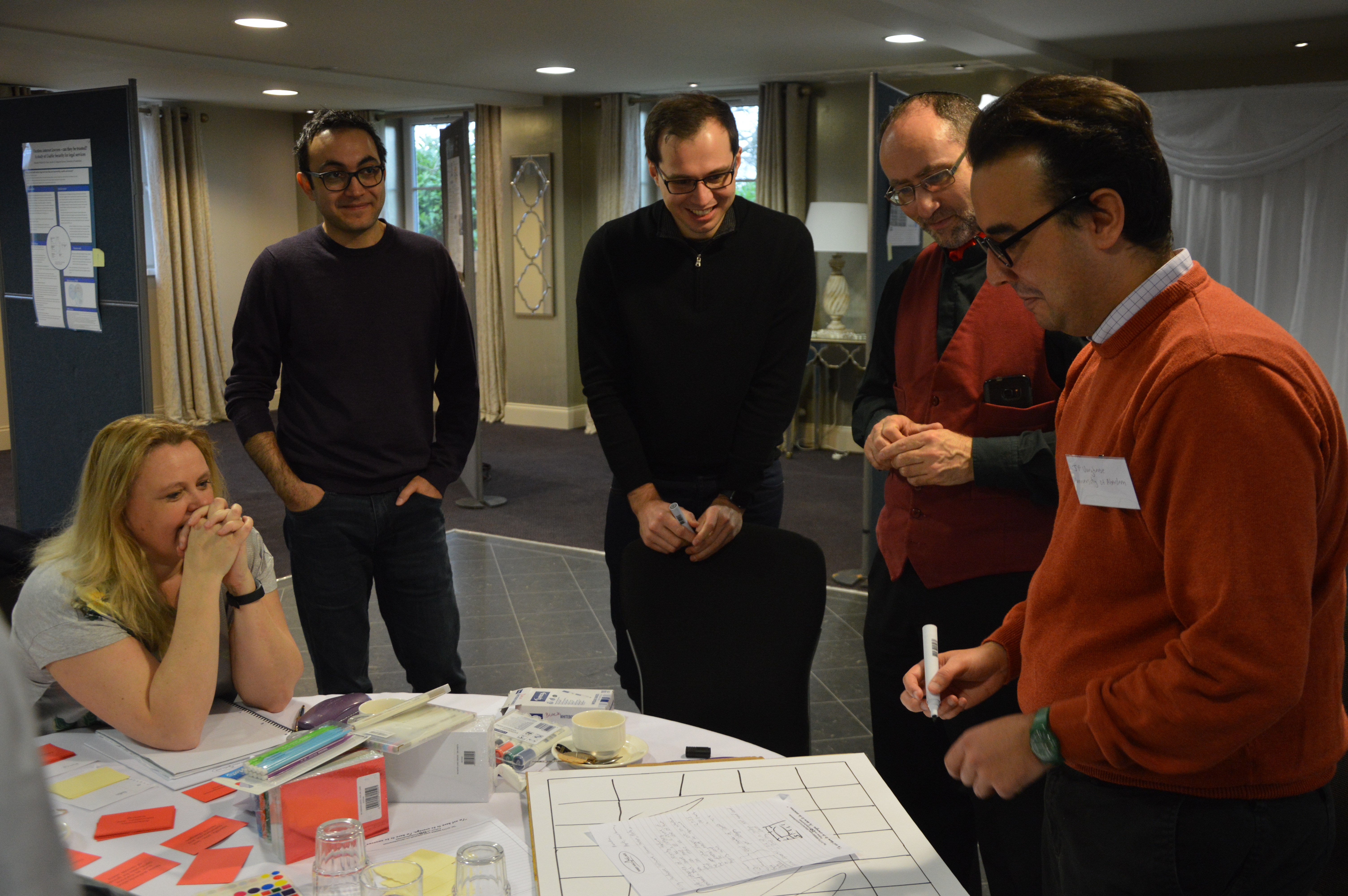
Multiple interactive workshops on recent issues and emerging research related to privacy, trust, and security were arranged in the event, including “Does the GDPR help or hinder trust, identity, privacy, and security?” conducted by Dr. Tristan Henderson and Judith Rauhofer. This workshop was about the new data protection regulations and its prospects. The new General Data Protection Regulation (GDPR) will be effected form 25 May 2018 and replaces the previous Data Protection Directive 95/46/ec. It is intended to provide a better data protection and security by many stricter obligations on data. One of the core functionalities of GDPR is to protect personal data in global prospect. However, it seems that many new laws may create negative effects on personal data protection through excessive complexity and interpretative problems. For example, new requirements bring extra record maintaining obligations that contain personal data and as a result, impose additional security risk for keeping and maintaining personal data privacy. Furthermore, the legislation does not fit for the micro and small business situations. Finally, many small business services do not have strong security records for data privacy. These problems and existing challenges in GDPR will likely become important areas for exploration and design.